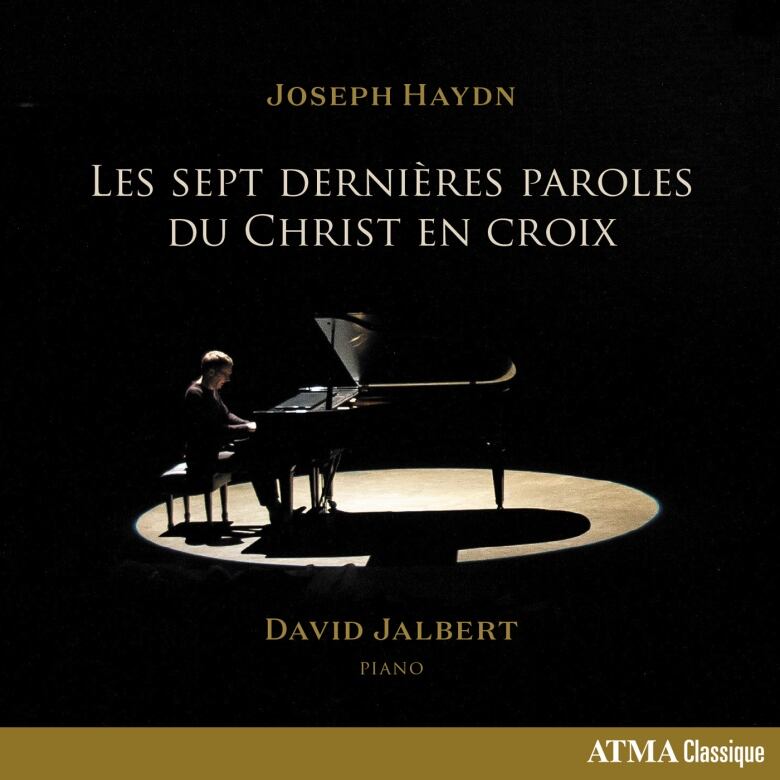'It was his greatest achievement': David Jalbert on Haydn's Seven Last Words
On his new album, he puts Haydn’s underappreciated work on par with late Beethoven and masterpieces by Mozart

"It was his favourite piece that he wrote — he was very proud of it," reflects David Jalbert, whose recording of the solo piano version of Haydn's Seven Last Words was released on Sept. 11 on ATMA Classique. "To him, it was his greatest achievement."
Haydn was commissioned to write the work by the Cathedral of Cadiz and its nine movements were designed to provide moments of reflection among the bishop's Lenten allocutions. The work was published in 1787 in three versions — orchestral, string quartet and solo piano — of which the latter is the least known.
"You have an introduction, then seven sonatas, each of which is based on one of the seven last words of Christ on the cross," Jalbert explained to CBC Music. "The music is very slow and rather spare. But to me, that's where Haydn reaches heights that he hadn't before. This music is as touching in its minimalism and its economy of means and language as late Beethoven or the greatest music by Mozart, and I find that a lot of it even anticipates Schubert.
"Although slow, the work contains dramatic and very grandiose moments as well as moments of tenderness," Jalbert continues. "There's a movement titled 'Woman, Behold Your Son' — the tenderness of the mother as she sees her son suffer like this is one of the most beautiful movements of the piece and a very warm and loving one despite the context."
The only fast movement of the 66-minute set is "The Earthquake," which flies by in two minutes and concludes the work with a depiction of the earthquake that follows Jesus's death on the cross.
'I got to play it night after night'
Haydn's Seven Last Words entered Jalbert's repertoire in 2018 when he performed it in Montreal as part of Golgotha Picnic, a play by Rodrigo García with a mise en scène by Angela Konrad.
"It requires a complete performance of the piece, in silence, during the context of the play — so, an entire hour of the play consists of a pianist playing a recital, basically. I got to play it night after night and got to know it really well. And it just felt like the right thing to do to record it."
Jalbert also felt he had something new and different to offer listeners.
"There are a few good recordings on fortepiano — period instruments from Haydn's time — but on the modern piano, there's a few here and there but nothing that great and it felt like a gap that I could fill," he says.
His interpretation also includes historically informed ornamentation.
"The movements are called 'sonatas' and they have repeats, so keyboard performance practice at the time would definitely mean that those would get decorated a little," explains Jalbert. "I'm ornamenting them a bit, hopefully with enough taste. It's not something that's really been done before, even on fortepiano. It's also something that sets the keyboard version apart from the string quartet or orchestra versions."
Jalbert credits his feel for music of the Viennese tradition in part to the late pianist and pedagogue Leon Fleisher, for whom he regularly played in masterclasses while studying at the Royal Conservatory's Glenn Gould School in 1999 and 2000.
"It's all about timing, right? The teaching of Fleisher was really about how to time music, how to do the right type of rubato, especially in the composers he really liked to work on: Haydn, Mozart, Beethoven, Schubert, Brahms — the Viennese composers were really the ones whom Fleisher identified with the most and where his teaching really shone."
Jalbert explains how Fleisher "totally defined" how he thinks about this music.

"He managed to communicate a real sense of inspiration, on top of teaching you something complex and rather conceptual about how to utilize rubato and timing in a way that is Viennese and true to the style of these composers and which is different from what you find in Liszt or Chopin — you play that music completely differently. And so it's a school of thought that, to me, is still the absolutely perfect way to approach this music."
Jalbert will celebrate the arrival of his new album with a concert performance of Haydn's Seven Last Words at Montreal's Bourgie Hall on Sept. 24. It's the third concert in Bourgie Hall's revised concert season, which contains 56 concerts to take place between Sept. 16 and Dec. 20 with reduced audiences and physical distancing measures in place. Jalbert's recital will be live streamed. Details here.